Sign up. Be inspired. Get clicking.
Outcome of the Nox emissions scandal revealed
1 February 2023
Did you know Volkswagen's "Dieselgate" scandal impacted approximately 11 million vehicles worldwide? This number far exceeds the 482,000 cars in the US that were initially reported. It stands as one of the largest scandals in the car industry’s history.
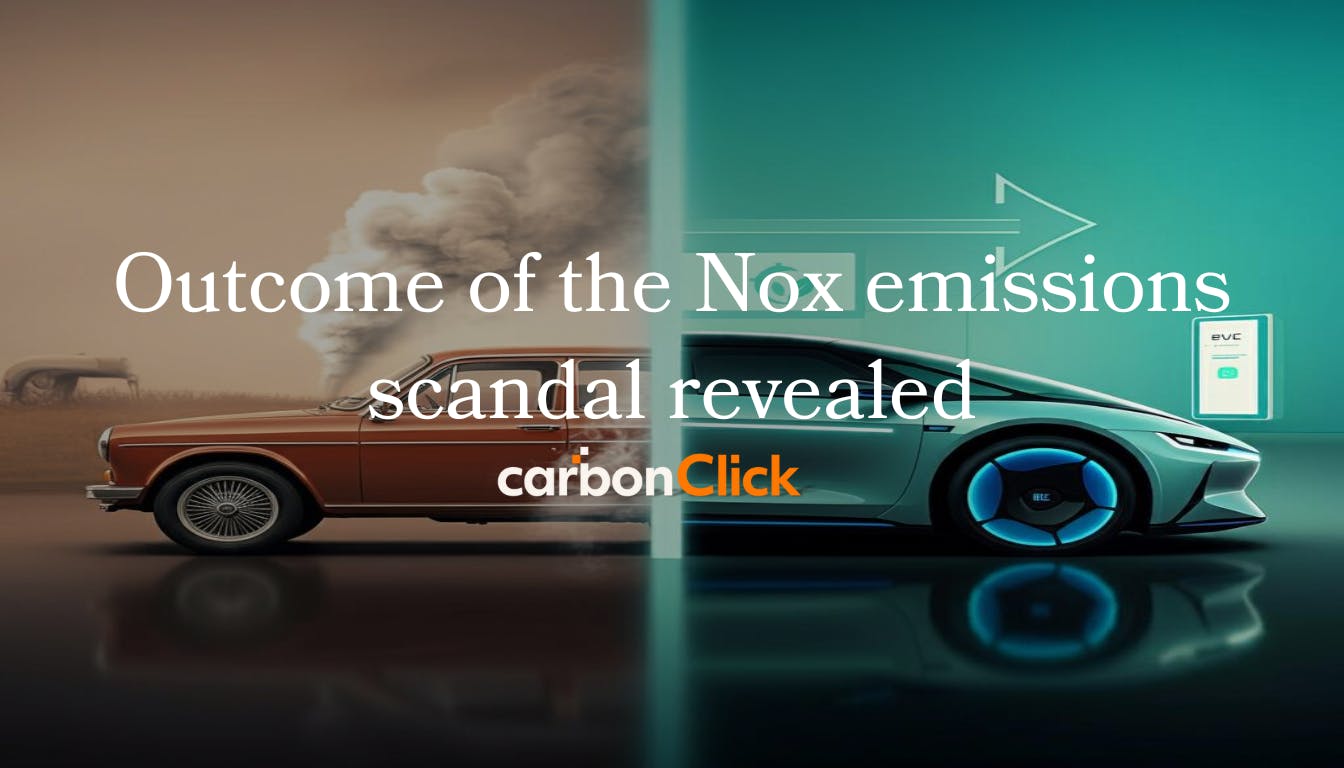
Outcome of the Nox emissions scandal revealed
The scandal was uncovered by the Environmental Protection Agency (EPA) in 2015. Volkswagen had installed "defeat devices" in diesel engines to cheat on emissions tests.
Once the truth emerged, Volkswagen admitted the wrongdoing. They recalled 8.5 million cars in Europe and 500,000 in the US. This led to the resignation of CEO Martin Winterkorn. The company allocated nearly €6.7 billion to address the costs.
They also agreed to spend up to $14.7 billion on settlements and reparations. Stock prices fell by a third, impacting investors. The entire automotive industry had to revise how emissions tests are conducted, increasing transparency.
Key Takeaways
- 11 million vehicles globally affected by "defeat devices".
- Volkswagen allocated €6.7 billion for scandal-related costs.
- CEO Martin Winterkorn resigned amid the crisis.
- Emissions testing standards underwent significant transformations.
- Volkswagen’s stock prices dropped by about one-third.

What triggered the Nox emissions scandal?
In September 2015, the Volkswagen emissions scandal, known as Dieselgate, erupted. It exposed significant fraud involving emissions test manipulation and misleading marketing. Around 11 million cars worldwide, including 500,000 in the US, manufactured between 2009 and 2015, were affected.
The EPA's Findings
The Environmental Protection Agency (EPA) discovered that Volkswagen had used a defeat device in their diesel engines. This device altered the engine settings during emissions tests to show lower NOx emissions. However, during normal driving, these cars emitted up to 40 times the legal limit of NOx gases.
This revelation highlighted Volkswagen's deception regarding emissions tests.
Volkswagen's Marketing Tactics
Volkswagen's advertisements claimed their diesel cars were environmentally beneficial, with low emissions. This was false, aimed at attracting more customers by promoting their vehicles as having minimal environmental impact. They misled both consumers and regulators, concealing the actual harm their diesel cars caused to the environment.
The Role of the Defeat Device
A software known as a defeat device was central to the scandal. It recognised when the car was undergoing testing and adjusted emissions to appear compliant. However, during regular driving, it allowed emissions to increase significantly.
This deception caused major issues for Volkswagen and raised serious concerns about honesty within the automotive industry. It also triggered global legal and regulatory actions.
Immediate company's actions
When the scandal hit, Volkswagen took bold steps to address the crisis and restore trust. We launched a comprehensive internal investigation, asked key executives to step down, and allocated significant funds to address the damage.
VW's Internal Inquiry
We promptly initiated an internal investigation into the scandal. This thorough examination aimed to determine the extent of the emissions cheating and identify those responsible. Over 40 individuals across different VW brands were found to be involved, highlighting the scale of the issue.
Executive Resignations
High-profile executives, including former CEO Martin Winterkorn, were required to leave. Winterkorn, who earned €18.6 million the year before, departed just five days after the truth emerged in September 2015. These resignations underscored Volkswagen's commitment to addressing the problem and improving its image.
Financial Provisions
Volkswagen set aside billions of euros to manage the fallout. This sum covered fines, penalties, and compensation for affected customers. The scandal led to a quarterly loss for the first time in 15 years, illustrating the magnitude of the issue. The U.S. received $25 billion from VW to settle fines and damages for 580,000 affected vehicles.

Legal Repercussions for Volkswagen
The Volkswagen emissions scandal resulted in significant legal challenges for the company. One major consequence was the Volkswagen NOx Emissions Group Litigation in England and Wales, which led to a settlement involving around 91,000 claimants. Volkswagen agreed to pay £193 million to resolve this litigation.
Earnings Reports
Following the scandal, Volkswagen's earnings reports reflected a substantial decline. The legal battles, settlements, and fines severely impacted the company's profits. Payments to claimants, legal costs, and fines from authorities significantly reduced their income.
In Australia, the Federal Court imposed a $125 million penalty, marking the largest fine ever imposed for breaching Australian Consumer Law.
Impact on Stock Prices
The stock market responded swiftly and severely to the scandal. Volkswagen's stock price dropped by approximately one-third, reflecting investors' concerns about the company’s financial stability and future prospects.
Subsequent news of legal settlements and fines exacerbated investor apprehension, leading to a prolonged period of volatility in Volkswagen's stock price.
Resignations and Replacements
The scandal triggered major changes in Volkswagen's leadership. CEO Martin Winterkorn resigned due to the legal issues, initiating a series of top-level changes within the company.
These leadership changes were part of Volkswagen's efforts to restore trust among regulators, investors, and customers.
Volkswagen addressed both financial and leadership challenges to manage the fallout, but the effects of these legal issues continue to impact the company’s strategies and policies.
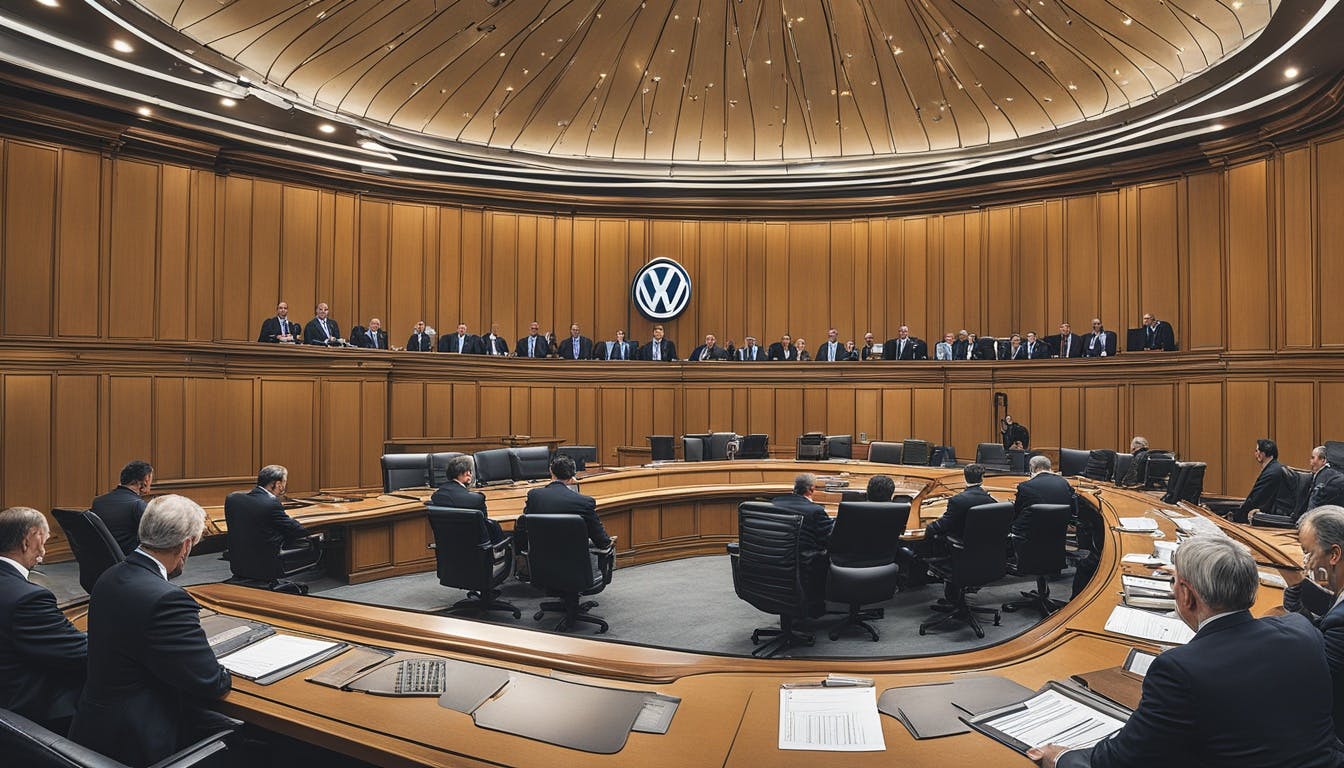
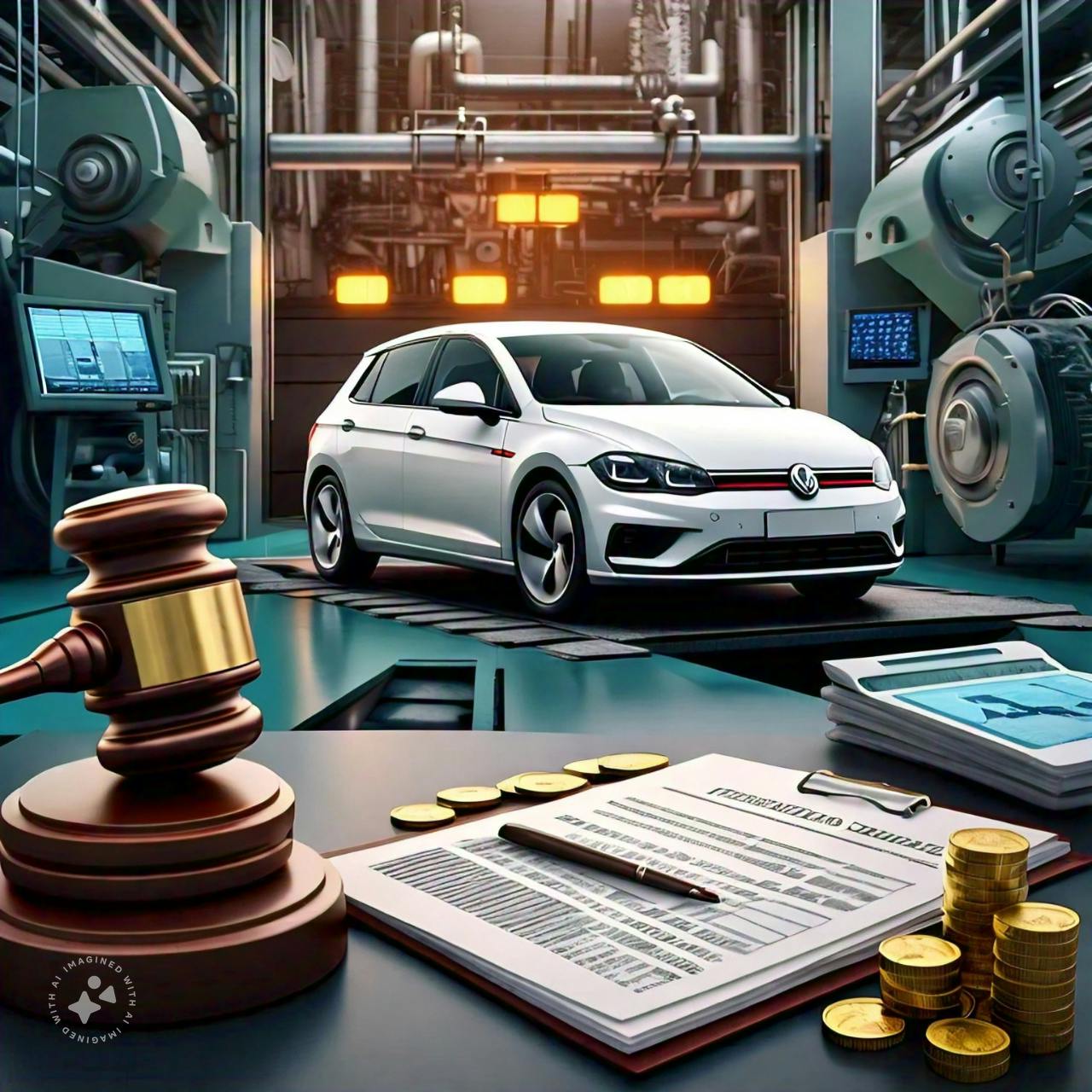
How Regulators Responded Globally
In 2015, Volkswagen's emissions scandal triggered a global response from regulators, leading to significant changes in how car manufacturers are monitored worldwide. The scandal prompted investigations in numerous countries, including the UK, South Korea, and Canada, which sought to determine if Volkswagen and other manufacturers had manipulated emissions tests. This international scrutiny led to substantial reforms and penalties.
Investigations Across Countries
Countries such as the UK, South Korea, and Canada initiated thorough investigations into the scandal. These inquiries aimed to establish whether Volkswagen and other companies had falsified emissions data. The widespread response focused on overhauling regulations and enhancing emissions testing procedures.
Research has shown that stricter emissions regulations in Europe from 2000 to 2014 increased the likelihood of cheating. For every 1% increase in regulation stringency, the probability of cheating rose by 1.72%. This demonstrates that stringent rules can sometimes drive companies to breach them.
Fines and Lawsuits
Volkswagen faced substantial financial losses as a result of the investigations. The company was heavily fined for violating emissions regulations. These penalties were designed to hold Volkswagen accountable and deter other companies from similar misconduct.
Studies indicated that relaxing some emissions standards could potentially reduce instances of cheating. If the EU were to double the permissible emissions limits, cheating among car manufacturers might decrease by 9-11%. This underscores the importance of having both rigorous regulations and feasible compliance measures.
The introduction of the ‘Real Driving Emissions’ (RDE) test and stricter regulations on diesel vehicles in the US mark a new phase in emissions control. Regulators are now placing greater emphasis on air quality and transparency in vehicle emissions. It has become clear that both stringent regulations and realistic compliance expectations are crucial to preventing future violations.
The impact on the Auto industry
The Volkswagen NOx emissions scandal, known as "Dieselgate," rocked the automotive industry. It exposed Volkswagen's use of defeat devices in diesel cars, fundamentally altering the sector.
Changes in Diesel Car Production
The scandal had a profound impact on the industry, leading to significant changes in diesel car production. Volkswagen had installed defeat devices in diesel engines that deactivated emission controls during normal driving, resulting in emissions levels far exceeding legal limits.
This revelation caused a significant decline in demand for diesel vehicles. In response, manufacturers shifted their focus. Volkswagen, for instance, invested 50 billion euros in electric vehicle development in November 2017. This strategic pivot away from diesel engines prompted other companies to reassess their own diesel strategies, accelerating the industry's shift towards electric vehicles (EVs).
Industry Trust Issues
"Dieselgate" led to substantial financial repercussions and eroded trust in car manufacturers globally. Volkswagen's market value plummeted, losing 27.4 billion euros within five days. Other automakers also experienced considerable declines in their valuations.
The scandal cast doubt on the integrity of the entire automotive sector. Consumers and regulators began to question the authenticity of environmental claims made by various companies. Approximately 60% of firms saw their market values decrease, reflecting widespread mistrust.
In the aftermath, Volkswagen engaged with a monitor appointed by the US Department of Justice to enhance transparency and regulatory compliance. These measures were crucial for restoring credibility in the automotive industry. Volkswagen’s efforts underscore the growing importance of honesty and transparency in regaining public trust.


Outcome of the Nox emissions scandal
The NOx emissions scandal led to significant changes for Volkswagen. The company had to implement buyback programmes and offer compensation to address the issue. These measures were intended to reduce the impact of the scandal and rebuild trust with customers.
Consumer Compensation
Volkswagen committed substantial resources to assist consumers. They allocated up to $10 billion for buybacks and cash payments to offset the economic losses caused by the scandal.
Additionally, they provided options for lease terminations and emissions system repairs. These measures were designed to ease the situation for those affected.
Buyback Programmes
Volkswagen's primary response involved initiating diesel car buyback schemes. Owners had the option to return their vehicles for a fair market value, determined prior to the scandal. This approach aimed to reassure customers and address the environmental issues associated with the diesel cars.
By implementing these buyback programmes, Volkswagen demonstrated their commitment to rectifying the damage caused. These schemes not only supported affected owners but also underscored the importance of corporate accountability in the face of major issues.
Environmental impact and mitigation efforts
The emissions scandal resulted in substantial environmental damage. Volkswagen's defeat device led to significant NOx emissions, causing major economic and ecological repercussions. Both the company and global regulators had to undertake considerable efforts to address these issues.
Short-Term Environmental Damage
The initial impacts of the scandal were severe. In 2015, diesel cars emitted 13.1 million tonnes of NOx, which was 4.6 million tonnes more than anticipated. This contributed to approximately 38,000 premature deaths worldwide. Heavy-duty vehicles were chiefly responsible, highlighting the need for urgent action.
Long-Term Remediation Programmes
Efforts to address the long-term consequences were substantial. For instance, Navistar Inc. committed to reducing NOx emissions by at least 10,000 tonnes and paid a $52 million fine. They also agreed to dismantle older diesel engines to prevent further NOx emissions. These measures were crucial in reducing environmental harm.
Sustainable Initiatives Fund
Investing in advanced vehicle technology was essential for a better future. Volkswagen had to fund these initiatives, driving the industry towards cleaner technology. This commitment helped to address past damage and advance environmentally beneficial technology. Collectively, these efforts highlight the importance of reducing pollution and protecting the environment.
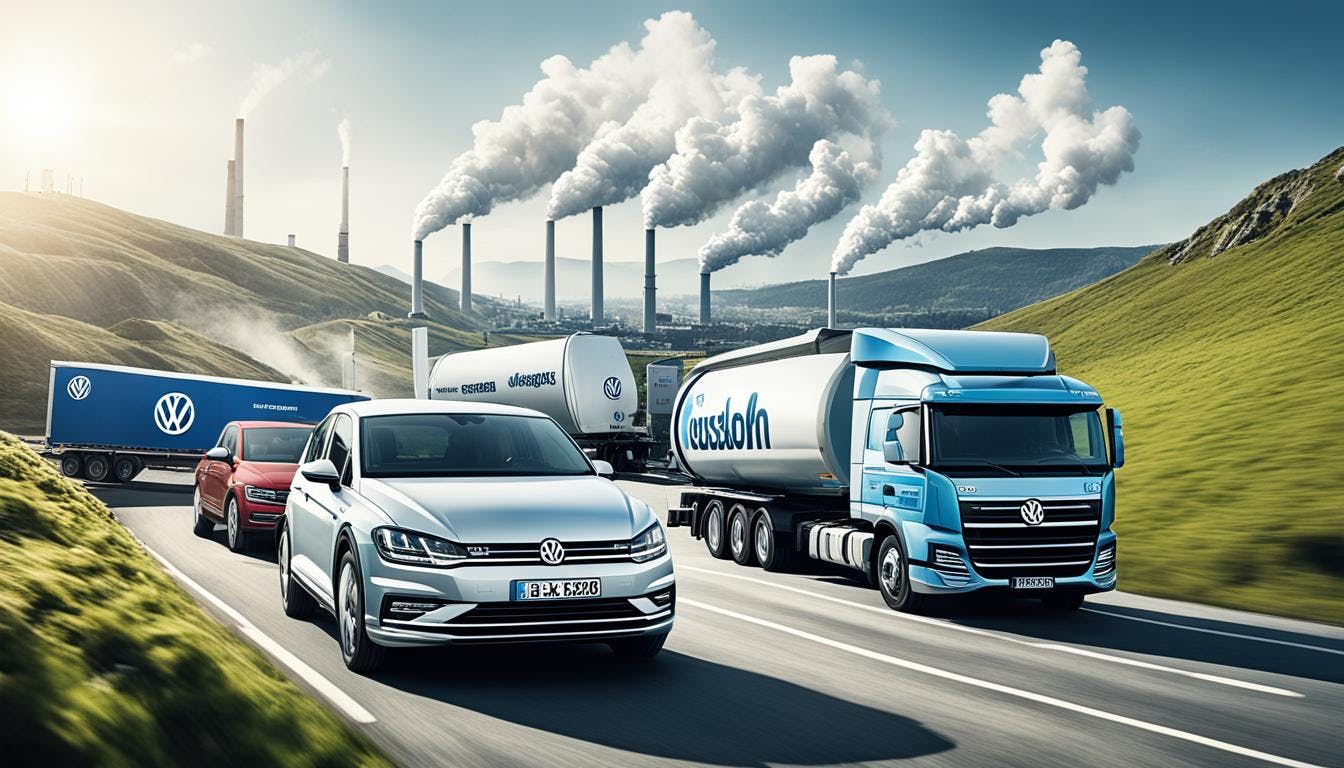

The broader effect on diesel vehicle sales
The NOx emissions scandal hit Volkswagen hard and shook the diesel vehicle market. Consumers lost trust in diesel engines, leading to a sharp drop in sales. This downturn was seen across Europe and the United States, marking a significant change in the auto industry.
Immediate Drop in Sales
After the scandal, diesel car sales fell rapidly. Volkswagen's diesel cars were found to emit up to forty times the legal NOx levels, resulting in over 600,000 VW diesel cars in the US being recalled.
Trust in diesel cars dropped, causing sales to plummet. From 2017 to 2020, diesel car registrations in the EU fell from 50% to just 27%. This demonstrates how swiftly consumer choices can impact the auto industry.
Long-Term Market Shifts
The scandal led to major changes in the auto industry. Consumers now favour petrol and electric cars more. The ambition to increase diesel car sales was lost due to these shifts.
Now, car makers focus more on hybrid and electric vehicles. Models like Porsche’s Taycan and Tesla's Model 3 have significantly contributed to this shift. By 2030, diesel sales in heavy industry are expected to rise slightly, from $229.0 billion to $308 billion.
EVs and petrol cars are becoming more competitively priced, making diesel less attractive. More buyers are opting for sustainable options over diesel. Heavy trucks and farm vehicles, significant polluters, present a challenge as regulations become stricter. This illustrates a major move towards sustainable and emission-free vehicles in the industry.
Legal and Corporate Accountability
The Volkswagen emissions scandal led to numerous legal actions and changes in corporate governance. This was a significant step towards holding companies more accountable. The court proceedings revealed the involvement of top executives, resulting in crucial modifications in the company's management.
Court Cases Involving Executives
Following the scandal, many executives faced legal charges for fraud and conspiracy. These Volkswagen court proceedings had serious consequences for some leaders. Over 45,000 claims were allowed to progress through the courts, demonstrating the widespread impact of the scandal.
The company admitted to installing illegal software in about 11 million vehicles to cheat on emissions tests, which exacerbated the legal issues for its leaders.
Claims against VW and other companies, such as BMW and Mercedes, have become major cases in Scottish courts. Increased funding for these lawsuits highlights the growing demand for companies to be accountable for their actions.
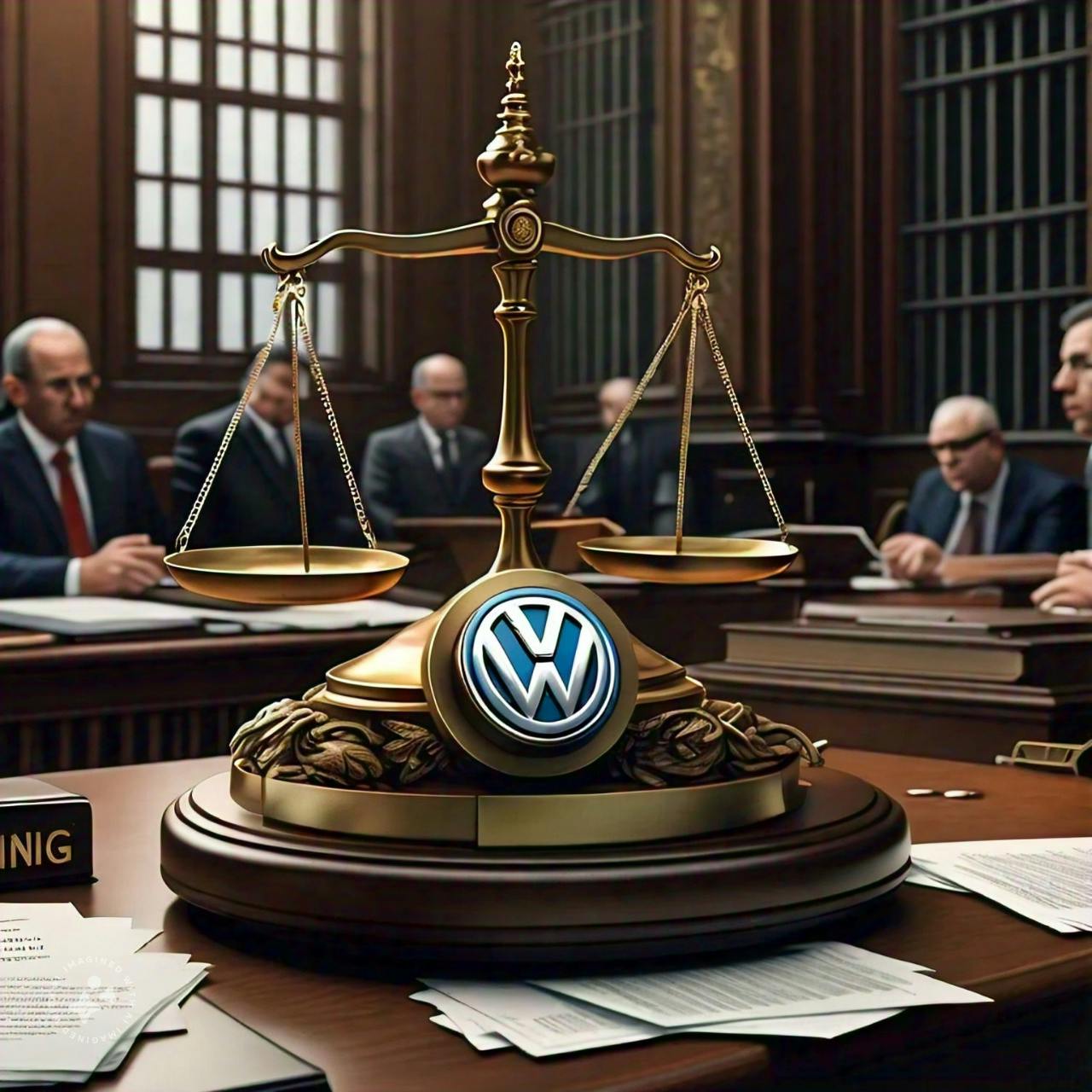
The civil litigation framework and the implementation of the Civil Litigation (Expenses and Group Proceedings) (Scotland) Act 2018 provided an avenue for consumers to band together and pursue claims against car manufacturers.
Corporate Reforms
The scandal led Volkswagen to make substantial changes to its corporate governance. The company now has improved safeguards to prevent such issues from recurring. In 2015, VW set aside €16.4 billion ($18.4 billion) for remediation and legal expenses.
The improvements in corporate governance also had a broad impact across the industry. Volkswagen's mistakes served as a significant lesson for others. The crisis prompted companies to reassess and enhance their governance, with a greater emphasis on transparency and accountability.
Volkswagen is actively working to restore its reputation and strengthen its governance. This reflects a shift towards increased accountability and more responsible practices within the automotive industry.
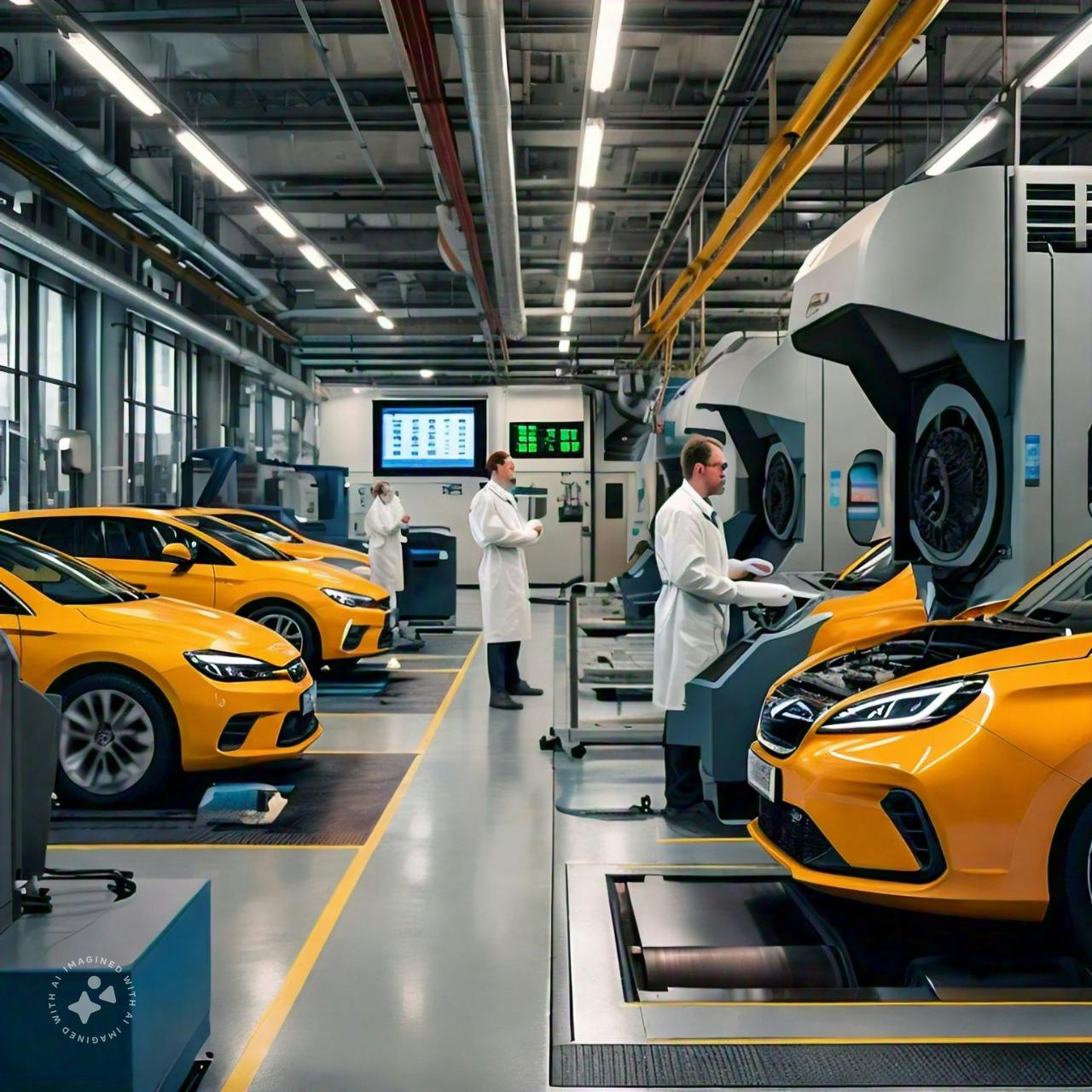
Future of emissions testing and regulations
The NOx emissions scandal has led to significant changes in how we test and regulate emissions. It exposed a considerable discrepancy between the results of emissions tests and actual vehicle performance. This gap was approximately 40% higher in fuel consumption and CO2 emissions.
As a result, car manufacturers and regulators are revising their testing methods. The Volkswagen scandal highlighted the need for improved testing procedures, revealing that some vehicles did not meet emissions standards.
New Regulatory Measures
New regulations are being introduced to prevent similar issues in the future. One key development is the adoption of the Worldwide Harmonized Light Vehicles Test Procedure (WLTP). This test is designed to more accurately reflect real driving conditions compared to older methods.
There is also a move towards establishing an independent European authority for vehicle testing. This would ensure that tests are conducted fairly and consistently, aligning emissions tests more closely with actual driving experiences.
Technological Innovations in Testing
Advancements in technology are also transforming emissions testing. Future tests will evaluate vehicle performance under real-world conditions and assess the efficiency of systems such as air conditioning.
The Environmental Protection Agency (EPA) in the US is leading the way with its road tests, prompting changes and demonstrating the need for similar tests in Europe. Additionally, websites that provide fuel consumption information could further clarify details for consumers.
Moving forward, aligning emissions tests with legal standards will be crucial. Keeping pace with technological advances and stringent regulations will help improve the environmental performance of vehicles. The push for more rigorous emissions tests and regulations is set to drive positive changes in the automotive industry.
FAQ's
How did Volkswagen’s marketing tactics contribute to the scandal?
Volkswagen's marketing portrayed their diesel cars as environmentally beneficial with low emissions. This was misleading, based on false emissions results from the defeat devices. This deception misled both consumers and regulators.
How did Volkswagen respond immediately after the scandal broke?
Upon the scandal's revelation, Volkswagen launched an internal investigation. Several high-ranking executives, including CEO Martin Winterkorn, resigned. The company also set aside billions of euros to cover the scandal's costs.
What legal repercussions did Volkswagen face?
Volkswagen faced severe legal consequences, including potentially billions of dollars in fines from the EPA. Their earnings and stock prices plummeted, worsening their financial situation.
How did global regulators respond to the emissions scandal?
After the EPA's findings, regulators in various countries, including the UK, South Korea, and Canada, investigated Volkswagen's actions. The company faced fines and lawsuits from around the world.
What was the impact on the automotive industry as a whole?
The scandal had a profound effect on the car industry, causing a decline in diesel vehicle sales. There was a shift towards petrol and electric cars, reduced trust in car manufacturers, and increased focus on meeting environmental standards.
What initiatives did Volkswagen undertake to address consumers?
Volkswagen agreed to spend up to $10 billion on vehicle buybacks, lease terminations, and emissions system repairs. These measures aimed to address the harm done to consumers and the environment.
What were the environmental impacts and Volkswagen’s mitigation efforts?
The defeat devices caused significant environmental damage. Volkswagen is now funding projects to address the harm and investing in zero-emission vehicles. The company is making substantial efforts to rectify their mistakes and support sustainable transport.
How did the scandal affect diesel vehicle sales?
Sales of diesel vehicles dropped significantly following the scandal. Many consumers began opting for petrol or electric cars instead, indicating major shifts in the automotive market.
What legal and corporate accountability measures were taken?
Numerous legal cases were initiated against Volkswagen leaders, accusing them of fraud and conspiracy. These actions led to changes in the company’s operations to prevent similar issues in the future.
How has the future of emissions testing and regulations changed post-scandal?
The scandal led to new rules and technological advancements in emissions testing. These changes aim to ensure accurate emissions data and prevent manipulation, making the industry more transparent and compliant with the law.
17 South Street
Auckland 1010
New Zealand
info@carbonclick.com- -
- X
Subscribe now to stay up to date with CarbonClick, carbon offsetting and climate action.
By signing up you agree to our Privacy Policy.


